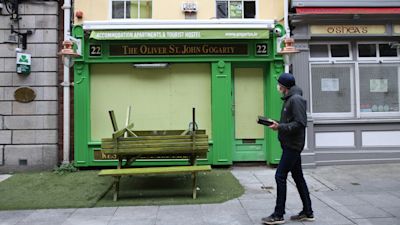Omicron: Ireland's new Covid restrictions kick in with curfews on bars and restaurants

Ireland's new Covid rules have kicked in on Monday, with 8pm curfews for bars and restaurants imposed as the Omicron variant surges.
From Monday, restaurants and bars, excluding takeaways and delivery services, must close at 8pm.
The Government has also said there should be no indoor events after 8pm and attendance at indoor and outdoor events earlier in the day will be restricted.
However, it is hoped more severe restrictions may be able to be avoided, the chief medical officer (CMO) has said.
Omicron is now the dominant Covid-19 strain in Ireland, according to health officials.
The measures, agreed by the cabinet on Friday, were introduced at midnight on Sunday and will last until January 30.
Restricted movement advice for all close contacts of Covid cases has also been ramped up.
Ireland's CMO, Dr Tony Holohan, said on Monday that the National Public Health Emergency Team would continue to monitor the spread of the Omicron variant over Christmas.
He did not rule out the need for tougher measures to protect the health system.
The Health Protection Surveillance Centre has estimated that approximately 52% of reported cases are now due to the Omicron variant.
Dr Holohan said that he hoped the measures would be enough to curb a sharp rise in infections, but warned people to “buy into not just the letter but the spirit of that guidance”.
He added: “We believe that if we can follow the measures that have been mandated and decided upon by Government that we can have without recourse to further restrictions, so my message is now to concentrate on what’s in front of us.”
He said that no decision has been made on extra restrictions, but stressed that health officials will keep watching the situation closely in the coming days.
“We’re not going away for Christmas,” he said.
“We continue to monitor the effects but a series of measures have now been mandated by Government. They’re only coming into effect today. We believe that they will substantially cut the total volume of social contact across society.”
Dr Holohan called on people to reduce the number of people they meet over Christmas.
“Because things are open, it doesn’t mean that you have to do them, necessarily.”
Get the latest updates from ITV News' Coronavirus: What You Need to Know podcast:
He refused to speculate over whether schools would remain closed after the Christmas holidays, amid concerns about the spread of the virus among children.
The CMO stressed that vaccines and booster jabs should protect people from severe disease.
Tanaiste Leo Varadkar, speaking to RTE, said the Government would not hesitate to introduce new restrictions if they were deemed necessary in the coming weeks.
The Fine Gael leader said Ireland needed to “weather” the latest wave.
“It means there will be very high case numbers. I hope people won’t be afraid to see that because it is a much more transmissible strain of virus so we will see very high case numbers.
“We are hoping and expecting that it won’t translate into hospitalisations and ICU admissions and deaths to the extent it did in previous waves.”
He said he did not foresee a situation where schools would not reopen in January.
Mr Varadkar also indicated that after Ireland had “conquered” the Omicron wave it should consider giving people “periods of greater freedom” on the understanding the future would bring more challenging new variants.
But hospitality groups have warned that the restrictions will lead to widespread closures and redundancies in the sector, as the new rules came into force.
Padraig Cribben, chief executive of the Vintners’ Federation of Ireland, said: “The reality is this decision will decimate the trade that was already on its knees.”
On Sunday, Public Expenditure Minister Michael McGrath said that no government wanted to be in the position of making decisions that would cost jobs, but said the first duty was to protect the health of the population.
What are the restrictions in Northern Ireland?
Stormont ministers will meet on Wednesday to consider potential new coronavirus restrictions in Northern Ireland.
Current advice is that indoor gatherings should have no more than 30 people present, while working from home is also recommended where possible.
A 'Covid pass' scheme requiring people to prove their status to gain entry to a range of hospitality venues and large-attendance events will be made mandatory.
Customers wishing to access nightclubs, pubs, restaurants and other licensed premises will need to provide proof of vaccination, a negative lateral flow test result, or evidence of a previous Covid infection.
The same rules will apply for entry to large indoor and outdoor events, such as concerts and sporting events.
On Friday, Health Minister Robin Swann announced that in response to the Omicron variant, all close contacts of confirmed Covid cases should self-isolate and get a PCR test - even if they are fully vaccinated.